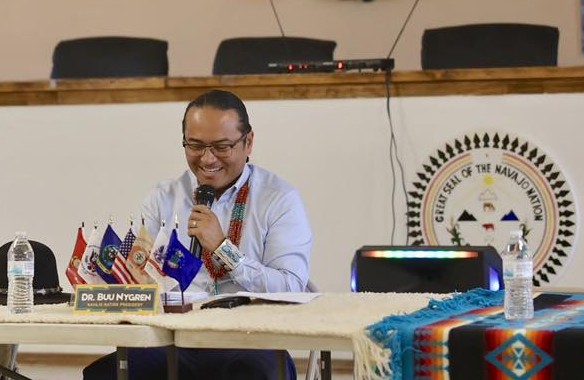SNOWFLAKE — What was poised to be a significant economic boost for rural Arizona and the Navajo Nation is now in the hands of a special prosecutor. Leaving the mobile home manufacturer ZenniHome and its employees caught in the middle.
In July 2025, ZenniHome shut down its modular housing project in LeChee, Arizona, located on the grounds of the former Navajo Generating Station near Page. The Phoenix-based company had been awarded tens of millions of dollars in American Rescue Plan Act funds by the Navajo Nation to produce modular homes.
ZenniHome executives said the tribe’s decision to reduce the scope of work from 160 homes to 80 and cancel a $24 million grant made the project unviable. ZenniHome also cited contractual breaches, delays, and political interference as reasons for the closure. The shutdown resulted in more than 210 layoffs, according to filings with the Arizona Department of Economic Security, and left the partially completed factory idle as tribal lawmakers called for an investigation into the project’s handling.
The fallout triggered outrage among Navajo Nation Council delegates. Speaker Crystalyne Curley decried the lack of clarity around the diverted funding, stating, “It is vital that we protect the integrity of our government and ensure accountability in the use of public funds.” Council members have since demanded public hearings on the matter. The controversy also disrupted Navajo Nation President Buu Nygren’s July 21 “state of the nation” address, when he walked out amid pointed questioning about the project.
In response, the Window Rock District Court appointed special prosecutor Kyle Nayback of New Mexico to investigate the ARPA-funded housing program. Nayback is a former Assistant U.S. Attorney with experience in federal Indian law, tribal justice, and appellate advocacy, including cases argued before the U.S. Supreme Court. His firm, Nayback Law, LLC, is 100 percent Native-owned and focused on representing Native American interests.
The investigation will examine the awarding and administration of contracts tied to the modular housing project, including agreements between the Navajo Nation, ZenniHome, Indigenous Design Studio + Architects, and Native Community Capital.
In an August 1, 2025, filing with the Special Division of the Window Rock District Court, Navajo Nation Chief Legislative Counsel Dana Bob Espino asserted that “there are reasonable grounds to pursue further investigation and possible prosecution regarding the Executive Branch’s contracting activities related to housing projects and a housing assistance program funded through the federal American Rescue Plan Act (ARPA).” The application, made under Navajo Nation Code 2 N.N.C. § 2021(E), seeks to examine the awarding and administration of contracts tied to the defunct modular housing project, including potential violations of procurement procedures and misuse of federal relief funds.
Areas of review are expected to include compliance with ARPA funding requirements, procurement procedures, and whether there was any misuse of public funds.
President Nygren declined an interview but defended his administration on social media, saying the probe “takes away from the needs of the Navajo people” and reaffirmed his confidence that “we did nothing wrong.” He urged leaders to focus on infrastructure, job creation, and public safety, while adding that he welcomed the investigation to clear the air.
ZenniHome shifted operations to Snowflake, repurposing a 300,000-square-foot former paper mill to launch a modular home factory. Local officials projected 200 jobs would be created in Phase One this fall, with plans to expand to 1,000 jobs by 2027.
On July 29, 2025, a late-night blaze struck the Snowflake site. Fire crews from multiple districts responded swiftly; no injuries were reported, but the facility sustained damage. Investigators believe the incident may be connected to a smaller fire earlier that same day, possibly caused by welding work performed by a subcontractor. They are exploring whether embers or heat from the initial mishap reignited later that night.
The sequence of events — closure of the LeChee plant, political fallout, relocation to Snowflake, and now a fire — places ZenniHome at the center of both economic promise and political controversy.
While Snowflake’s investment in the new facility offers a potential lifeline for jobs and industrial growth, the Navajo Nation, meanwhile, faces growing pressure to bolster transparency in how public funds are awarded and monitored, with some delegates calling for stricter oversight measures to prevent similar controversies in the future.




